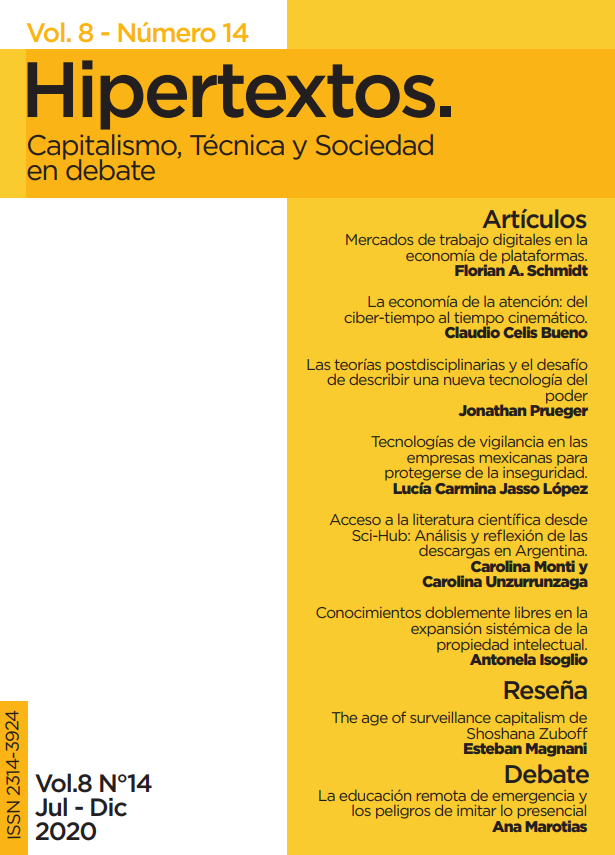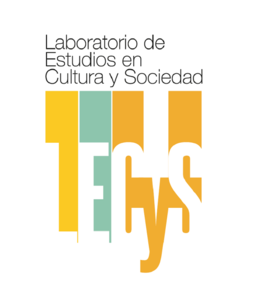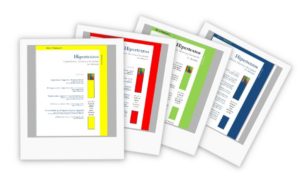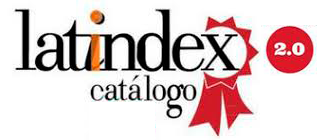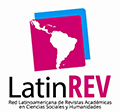Access to scientific literature from Sci-Hub
Analysis and thoughts on downloads from Argentina
DOI:
https://doi.org/10.24215/23143924e022Keywords:
Sci-Hub, piracy, open access, scientific papers, copyright, ArgentinaAbstract
The commercialization of scientific information and the payment walls for access have become one of the most debated issues in the last decades. The international open access movement has proposed ways to improve access and, and also, different actors have promoted other strategies such as pirate sites for data downloading. In this paper we study the use of Sci-Hub in Argentina based on a quantitative analysis of the download statistics available until 2017. We detect general, editorial and thematic patterns of use of the documents and investigate common and differentiating aspects with respect to global and other Latin American countries. We also determine, from different samples, if the articles accessed are also available in open access and/or their access is possible through subscriptions paid by the national government through the Electronic Library of Science and Technology (BECyT). We found that downloads from Argentina represent just over 1% of those registered worldwide, that there is a great dispersion of requested titles and that there is a significant increase in use with respect to the same periods in 2015 and 2016. With the different samples we could observe that articles of restricted access published by the editorial companies that manage the sector as an oligopoly are being downloaded mostly in magazines indexed in the so-called "mainstream" and that correspond to the area of medicine (oncology, pediatrics and cardiovascular medicine). Also, we detected a significant number of downloads of articles that were already available in open access, indicating a possible lack of knowledge of these resources and we calculate a significant increase compared to the use of BECyT. We concluded that downloads from Argentina have similar patterns to the rest of the world and that the increase in their use shows that a more radical change is needed to guarantee the right of access to information. As long as scientific information remains a commodity, it is essential to deepen the study of the different projects that allow us to reappropriate knowledge.
Downloads
References
Anderson, R. (2018). Is Copyright Piracy Morally Wrong or Merely Illegal? The Malum Prohibitum/Malum in Se Conundrum [mensaje en el blog The Scholarly Kitchen] . Recuperado de https://scholarlykitchen.sspnet.org/2018/04/30/copyright-piracy-morally-wrong-merely-illegal-malum-prohibitum-malum-se-conundrum/
Anderson, R. (2019). They Know We Know They Know: Does Sci-Hub Affect Library Subscriptions? [mensaje en el blog The Scholarly Kitchen]. Recuperado de https://scholarlykitchen.sspnet.org/2019/07/03/they-know-we-know-they-know-does-sci-hub-affect-library-subscriptions/
Banzato, G. (2019). Soberanía del conocimiento para superar inequidades: políticas de Acceso Abierto para revistas científicas en América Latina. Sao Paulo, Mecila Working Papers. Recuperado de http://mecila.net/wp-content/uploads/2019/08/WP-18-Banzato-Online-Final.pdf
Bekerman, F. (2018). Morfología del espacio científico-universitario argentino: una visión de largo plazo (1983-2014). Ciencia, Docencia Tecnología, 29(56), 18-46. Recuperado de http://www.pcient.uner.edu.ar/cdyt/article/view/361
Björk, B.C. (2017). Gold, green, and black open access. Learned Publishing, 30(2), 173-175. https://doi.org/10.1002/leap.1096
Bodó, B. (2016). Pirates in the Library – An Inquiry into the Guerilla Open Access Movement. Glasgow, UK: Social Science Research Network, 2016. https://papers.ssrn.com/sol3/papers.cfm?abstract_id=2816925.
Bohannon, J. (2016). Who’s downloading pirated papers? Everyone. Science, 352(6285), 508-512. https://doi.org/10.1126/science.352.6285.508
Bohannon, J., y Elbakyan, A. (2017). Data from: Who's downloading pirated papers? Everyone, Dryad, Dataset, https://doi.org/10.5061/dryad.q447c
Budapest Open Access Initiative (2002). Recuperado 20 de octubre de 2020, de https://www.budapestopenaccessinitiative.org/
Coalition S (2019). Principles and implementation. Recuperado de https://www.coalition-s.org/addendum-to-the-coalition-s-guidance-on-the-implementation-of-plan-s/principles-and-implementation/
Consejo Latinoamericano de Ciencias Sociales [CLACSO] (2015) Declaración CLACSO sobre el acceso abierto al conocimiento gestionado como un bien común. En XXV Asamblea General Ordinaria. CLACSO: Medellín. Recuperado de https://www.clacso.org.ar/conferencia2015/documentos/asamblea/declaraciones/4-Declaracion-de-CLACSO-sobre%20el-acceso-abierto-al-conocimiento-gestionado-como-un-bien-comun.pdf
Elbakyan, A. (2018, julio 7). Why Sci-Hub is illegal, and what you can do about it [mensaje en el blogEngineuring]. Recuperado de https://engineuring.wordpress.com/2018/07/07/why-sci-hub-is-illegal-and-what-you-can-do-about-it/
Erkal, E. (2019) Allegations linking sci-hub with russian intelligence. Elsevier Connect. Recuperado de https://www.elsevier.com/connect/allegations-linking-sci-hub-with-russian-intelligence
Fuchs, C., y Sandoval, M. (2013). The Diamond Model of Open Access Publishing: Why Policy Makers, Scholars, Universities, Libraries, Labour Unions and the Publishing World Need to Take Non-Commercial, Non-Profit Open Access Serious. tripleC: Communication, Capitalism & Critique. Open Access Journal for a Global Sustainable Information Society, 11(2), 428-443. https://doi.org/10.31269/triplec.v11i2.502
Gardner, G.J., McLaughlin, S.R., y Asher, A.D. (2017). Shadow libraries and you: Sci-hub usage and the future of ill. En ACRL 2017, Baltimore, Maryland, March 22–25, 2017. Recuperado de http://www.ala.org/acrl/sites/ala.org.acrl/files/content/conferences/confsandpreconfs/2017/ShadowLibrariesandYou.pdf
González-Solar, L., y Fernández-Marcial, V. (2019). Sci-Hub, a challenge for academic and research libraries. El profesional de la información, 28(1), e280112. https://doi.org/10.3145/epi.2019.ene.12
Greshake, B. (2016, junio, 2). Correlating the Sci-Hub Data with World Bank Indicators and Identifying Academic Use. The Winnower, 3, e146485.57797. https://doi.org/10.15200/winn.146485.57797
Greshake, B. (2017a) Data and Scripts for Looking into Pandora's Box: The Content of Sci-Hub and its Usage. https://doi.org/10.5281/zenodo.472493
Greshake, B. (2017b). Looking into Pandora’s Box: The Content of Sci-Hub and its Usage. F1000Research, 6, 541. https://doi.org/10.12688/f1000research.11366.1
Greshake, B. (2018). Sci-Hub download log of 2017 [Data set]. Zenodo. http://doi.org/10.5281/zenodo.1158301
Guédon, J. (2011). El acceso abierto y la división entre ciencia “principal” y “periférica”. Crítica y Emancipación, 6, 135-180. Recuperado de https://core.ac.uk/download/pdf/11889704.pdf
Himmelstein, D. S., Romero, A. R., Levernier, J. G., Munro, T. A., McLaughlin, S. R., Greshake Tzovaras, B., y Greene, C. S. (2018). Sci-Hub provides access to nearly all scholarly literature. ELife, 7, e32822. https://doi.org/10.7554/eLife.32822
Larivière, V., Haustein, S., y Mongeon, P. (2015). The Oligopoly of Academic Publishers in the Digital Era. PLOS ONE, 10(6), e0127502. https://doi.org/10.1371/journal.pone.0127502
Lund, A., y Zukerfeld, M. (2020). Corporate capitalism’s use of openness: Profit for free? Springer International Publishing. https://doi.org/10.1007/978-3-030-28219-6
Machin-Mastromatteo, J.D., Uribe-Tirado, A., y Romero-Ortiz, M.E. (2016). Piracy of scientific papers in Latin America: An analysis of Sci-Hub usage data. Information Development, 32(5), 1806-1814. https://doi.org/10.1177/0266666916671080
Mejia, C.R., Valladares-Garrido, M.J., Miñan-Tapia, A., Serrano, F.T., Tobler-Gómez, L.E., Pereda-Castro W., et al. (2017) Use, knowledge, and perception of the scientific contribution of Sci-Hub in medical students: Study in six countries in Latin America. PLoS ONE, 12(10): e0185673. https://doi.org/10.1371/journal.pone.0185673
Merino, G. y Banzato, G. (2019, octubre, 10). El Ministerio de Educación de la Argentina y la Coalición S: una asociación que restringirá el Acceso Abierto [mensaje del blog AmeliCA]. Recuperado de http://amelica.org/index.php/2019/10/10/el-ministerio-de-educacion-de-la-argentina-y-la-coalicion-s-una-asociacion-que-restringira-el-acceso-abierto/
Monti, C. (2019). Las vías alternativas para el Acceso Abierto : Estudio de disponibilidad de las publicaciones de una comunidad especializada en ecología acuática en Argentina (Tesina de grado). Universidad Nacional de La Plata. Recuperado de http://www.memoria.fahce.unlp.edu.ar/tesis/te.1819/te.1819.pdf
Nicholas, D., Boukacem‐Zeghmouri, C., Xu, J., Herman, E., Clark, D., Abrizah, A., … Świgoń, M. (2019). Sci‐Hub: The new and ultimate disruptor? View from the front. Learned Publishing, 32(2), 147-153. https://doi.org/10.1002/leap.1206
Piwowar, H., Priem, J., Larivière, V., Alperin, J. P., Matthias, L., Norlander, B., … Haustein, S. (2018). The state of OA: A large-scale analysis of the prevalence and impact of Open Access articles. PeerJ, 6, e4375. https://doi.org/10.7717/peerj.4375
Piwowar, H., Priem, J., y Orr, R. (2019). The Future of OA: A Large-Scale Analysis Projecting Open Access Publication and Readership. BioRxiv, 795310. https://doi.org/10.1101/795310
Schiermeier, Q. (2017). US court grants Elsevier millions in damages from Sci-Hub. Nature News. https://doi.org/10.1038/nature.2017.22196
Sci-Hub. (2020). Sci-Hub: Removing barriers in the way of science. Recuperado de https://sci-hub.tw/
Till, B. M., Rudolfson, N., Saluja, S., Gnanaraj, J., Samad, L., Ljungman, D., y Shrime, M. (2019). Who is pirating medical literature? A bibliometric review of 28 million Sci-Hub downloads. The Lancet Global Health, 7(1), e30-e31. https://doi.org/10.1016/S2214-109X(18)30388-7
Travis, J. (2016). In survey, most give thumbs-up to pirated papers. Science news, May 6th. https://doi.org/10.1126/science.aaf5704
Wikipedia (2019). Anexo: Países y territorios dependientes por población. https://es.wikipedia.org/wiki/Anexo:Pa%C3%ADses_y_territorios_dependientes_por_poblaci%C3%B3n)
Zukerfeld, M. (2019). Piratería y desarrollo: Historias, teoría y política de la apropiación impaga de conocimientos. Facultad Libre. Recuperado de https://www.youtube.com/watch?v=Jk-04gWlszc

